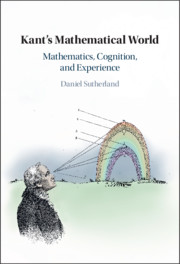Book contents
- Kant’s Mathematical World
- Kant’s Mathematical World
- Copyright page
- Dedication
- Contents
- Preface and Acknowledgments
- 1 Introduction
- Part I Mathematics, Magnitudes, and the Conditions of Experience
- Interlude The Greek Mathematical Tradition as Background to Kant
- Part II Kant’s Theory of Magnitudes, Intuition, and Measurement
- 7 Kant’s Reworking of the Theory of Magnitudes
- 8 Kant’s Revision of the Metaphysics of Quantity
- 9 From Mereology to Mathematics
- 10 Concluding Remarks
- Bibliography
- Index
10 - Concluding Remarks
from Part II - Kant’s Theory of Magnitudes, Intuition, and Measurement
Published online by Cambridge University Press: 21 October 2021
- Kant’s Mathematical World
- Kant’s Mathematical World
- Copyright page
- Dedication
- Contents
- Preface and Acknowledgments
- 1 Introduction
- Part I Mathematics, Magnitudes, and the Conditions of Experience
- Interlude The Greek Mathematical Tradition as Background to Kant
- Part II Kant’s Theory of Magnitudes, Intuition, and Measurement
- 7 Kant’s Reworking of the Theory of Magnitudes
- 8 Kant’s Revision of the Metaphysics of Quantity
- 9 From Mereology to Mathematics
- 10 Concluding Remarks
- Bibliography
- Index
Summary
Chapter 10 briefly comments the influence of Euclid’s theory of magnitude and the Eudoxian theory of proportions on Kant’s thought in light of advances in mathematics from the early seventeenth century to the late eighteenth century. Despite these advances, mathematics was still often viewed as a science of magnitudes and their measure. The chapter also indicates further work to be done to understand Kant’s philosophy of geometry, arithmetic, algebra, and analysis.
- Type
- Chapter
- Information
- Kant's Mathematical WorldMathematics, Cognition, and Experience, pp. 281 - 285Publisher: Cambridge University PressPrint publication year: 2021

